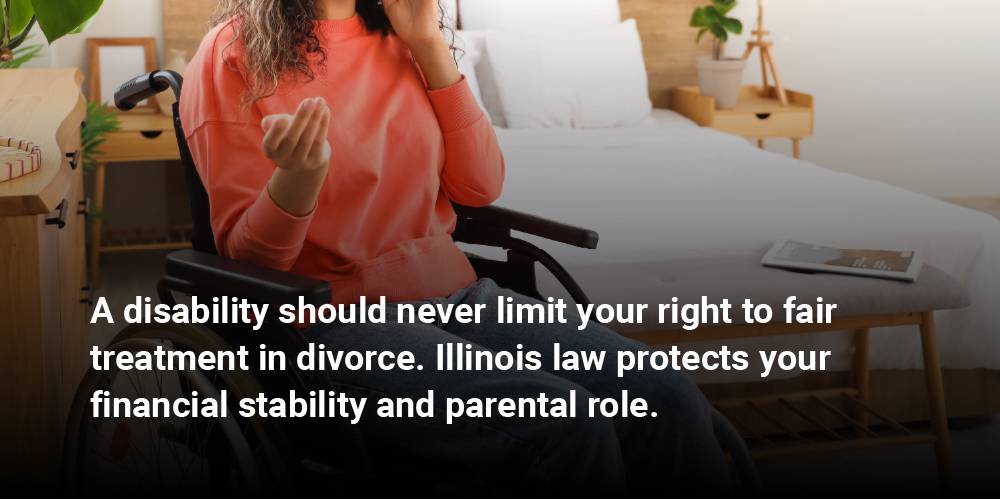What Protections Does a Disabled Person Receive in a Divorce?
 The decision to divorce can be even more difficult than usual if you have a disability. Although you may be unhappy in your marriage, you may also worry about how you will manage to support yourself after a divorce. You may rely on your spouse’s income and health insurance if you are unable to work or are limited because of your condition.
The decision to divorce can be even more difficult than usual if you have a disability. Although you may be unhappy in your marriage, you may also worry about how you will manage to support yourself after a divorce. You may rely on your spouse’s income and health insurance if you are unable to work or are limited because of your condition.
If you have children, you are probably wondering whether your disability will mean you get limited parenting time. However, you should not have to feel trapped in an unhealthy marriage just because you deal with a disability. Illinois divorce laws can help support you financially and protect your parental rights. Understanding these protections is key to achieving a fair outcome.
From spousal maintenance and healthcare coverage to guardianship and property division, Illinois statutes and case law provide extra safeguards to preserve a disabled spouse’s independence and dignity. Consulting with an experienced Kane County, IL divorce lawyer can help ensure that your future is protected.
How Does the Law Protect Disabled Individuals in an Illinois Divorce?
The Illinois Marriage and Dissolution of Marriage Act (750 ILCS 5) addresses all issues related to divorce. Section 504 discusses the factors that are used for determining whether spousal support should be granted. These include the length of the marriage and the spouses’ respective earning capacity, health, and ability to be self-supporting. Section 503 discusses each spouse’s physical and mental condition as it relates to property and asset division. Under Section 602.7, judges must consider a parent’s disability only if it affects the child’s safety or well-being.
If you are worried about being treated unfairly because of your disability, there are laws that protect you. The Illinois Human Rights Act (775 ILCS 5/1-102) bans discrimination based on disability in court or property matters. The Americans with Disabilities Act also makes sure people with disabilities get the help they need in court.
How Can a Disability Impact Spousal Maintenance Payments in Illinois?
In any divorce, a person who is financially dependent on their spouse will usually receive spousal maintenance, commonly known as alimony, while they adjust to their new financial reality. Spousal maintenance is particularly crucial for someone with a disability because he or she may:
-
Be unable to work or generate a steady income
-
Have frequent healthcare expenses
-
Require assistance at home
-
Need equipment to treat their condition or accommodate their disability
Your disability benefits might not cover all your expenses. Spousal maintenance can help pay the rest. You and your spouse can agree on how much and how long the payments last, or the court can decide.
If you cannot support yourself because of your disability, the court may order long-term or permanent maintenance. Judges look at medical records, your health outlook, and your ability to work when deciding.
If your disability is short-term, the court may order temporary payments and review them later. For long-term or permanent disabilities, the court may allow ongoing support that does not end. In many Illinois cases, a person’s health and ability to work have played a big part in these decisions.
Property Division During an Illinois Divorce with a Disabled Spouse
If one spouse has a disability, the court may give that person a larger share of the property. This can happen if the disability makes it hard or impossible to work and earn money. Illinois divides property fairly, not always equally, so the goal is fairness, not a 50/50 split.
Social Security Disability Insurance (SSDI) is personal income, not shared property. However, it can still affect spousal support. Employer disability benefits may be partly shared and partly personal, depending on when they were earned. Health savings accounts or long-term care policies may go to the disabled spouse to help with future medical needs.
Healthcare Issues for a Disabled Spouse During an Illinois Divorce
You may be able to stay on your ex-spouse’s health insurance for a short time through COBRA or a state program. Spousal support can sometimes change your eligibility for benefits like Medicaid or SSI. When dividing property, the court may set up a special needs trust. This can help you keep your healthcare and public benefits while still giving you extra financial support.
Are Disabled Parents at a Disadvantage for Parental Rights in Illinois?
Illinois divorce laws do not limit your parental rights just because you have a disability. However, the court will look at your ability to care for your children when deciding parenting time. If your disability makes it hard to meet their needs, the judge may give your spouse more time with the children.
The court can also order changes to visits or add support services to help you stay involved. Judges focus on your real parenting abilities, not on stereotypes about disability.
When it comes to child support, Illinois law expects both parents to contribute to their children’s needs. However, the parent with the majority of parenting time is usually not required to make direct payments, since their financial contribution comes through daily care. The other parent—often the one with less parenting time—will be ordered to pay support based on the Illinois Income Shares Model.
If you have a disability, your child support obligation will depend on your actual income or disability benefits. The court considers each parent’s financial resources, so if your spouse earns significantly more, your payments will reflect that difference.

Practical Steps for Disabled Spouses During an Illinois Divorce
The following steps can be helpful for disabled spouses during a divorce:
-
Gather all necessary medical documentation, including employment restrictions, treatment plans, and long-term prognosis.
-
Ask for spousal support that covers your real care costs, including medicine, therapy, and medical equipment.
-
Explore structured settlement options or a special needs trust.
-
Ensure reasonable accommodations during the divorce proceedings.
-
Retain both a family law attorney and a benefits specialist to coordinate state and federal program eligibility.
Contact a St. Charles, IL Divorce Attorney
A divorce agreement should be designed to meet your needs, whatever they may be. If you have a disability, Illinois law offers strong protections to help keep your health, finances, and dignity safe during divorce. At Goostree Law Group, our Kane County, IL divorce lawyers understand the major impact your divorce agreement can have on the rest of your life. To schedule a free consultation, call 630-584-4800.












